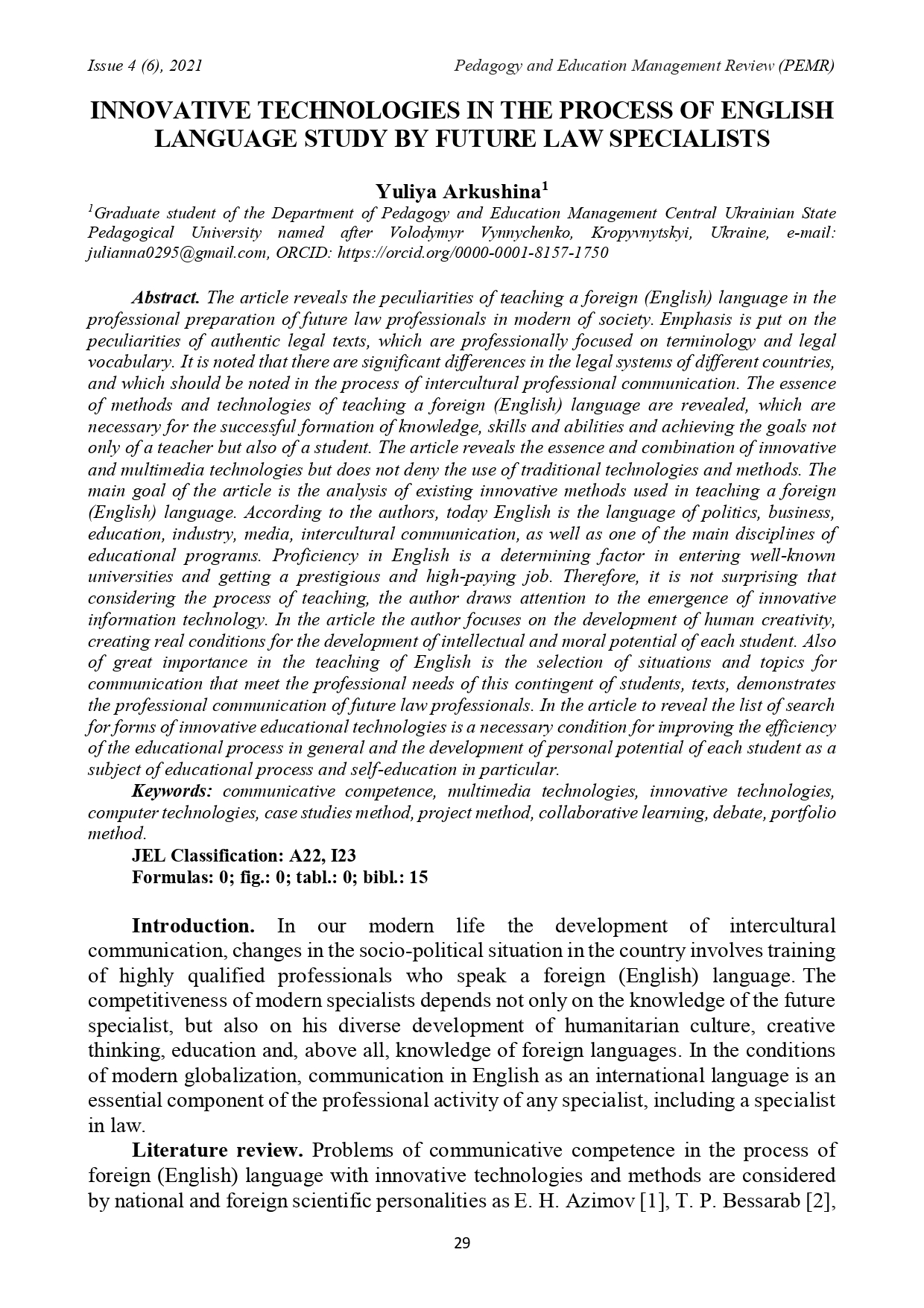INNOVATIVE TECHNOLOGIES IN THE PROCESS OF ENGLISH LANGUAGE STUDY BY FUTURE LAW SPECIALISTS
DOI:
https://doi.org/10.36690/2733-2039-2021-4-29Keywords:
communicative competence, multimedia technologies, innovative technologies, computer technologies, case studies method, project method, collaborative learning, debate, portfolio methodAbstract
The article reveals the peculiarities of teaching a foreign (English) language in the professional preparation of future law professionals in modern of society. Emphasis is put on the peculiarities of authentic legal texts, which are professionally focused on terminology and legal vocabulary. It is noted that there are significant differences in the legal systems of different countries, and which should be noted in the process of intercultural professional communication. The essence of methods and technologies of teaching a foreign (English) language are revealed, which are necessary for the successful formation of knowledge, skills and abilities and achieving the goals not only of a teacher but also of a student. The article reveals the essence and combination of innovative and multimedia technologies but does not deny the use of traditional technologies and methods. The main goal of the article is the analysis of existing innovative methods used in teaching a foreign (English) language. According to the authors, today English is the language of politics, business, education, industry, media, intercultural communication, as well as one of the main disciplines of educational programs. Proficiency in English is a determining factor in entering well-known universities and getting a prestigious and high-paying job. Therefore, it is not surprising that considering the process of teaching, the author draws attention to the emergence of innovative information technology. In the article the author focuses on the development of human creativity, creating real conditions for the development of intellectual and moral potential of each student. Also of great importance in the teaching of English is the selection of situations and topics for communication that meet the professional needs of this contingent of students, texts, demonstrates the professional communication of future law professionals. In the article to reveal the list of search for forms of innovative educational technologies is a necessary condition for improving the efficiency of the educational process in general and the development of personal potential of each student as a subject of educational process and self-education in particular.
Downloads
References
Azizova, S. M. (2016) Osobennosti professional'no-orientirovannogo obucheniya anglijskomu yazyku studentov yuridicheskogo profilya [Features of professionally oriented teaching of English to legal students], Pedagogicheskij zhurnal, № 4, p. 251-260 [in Russian].
Bessarab, T. P. (2015) Inostrannyj yazyk kak sposob professional'noj podgotovki studentov-yuristov [Foreign language as a way of professional training of law students], Samara, p. 136-138.[in Russian].
Gulyaeva, E. V. (2014) Rol' anglijskogo yazyka kak posrednika v global'nom prostranstve obrazovaniya [The Role of the English Language as a Mediator in the Global Education Space], Tambov: Gramota, №1, Ch. 2, p.72-75.[in Russian].
Zykova, T. V., Kochkurova, E. A. (2016) Ispol'zovanie aktivnyh metodov obucheniya pri izuchenii upravlencheskih disciplin [The use of active teaching methods in the study of management disciplines], Sb. statej: NNGU, N. Novgorod, p. 109-111.[in Russian]
Kolar'kova, O. G., Savina, A. A. (2016) Organizaciya samostoyatel'noj raboty studentov srednego professional'nogo obrazovaniya pri obuchenii inostrannomu yazyku v kontekste kompetentnostnogo podhoda [Organization of independent work of students of secondary vocational education in teaching a foreign language in the context of a competence-based approach], Moskva, Akademiya Estestvoznaniya, №3, p.143-147.[in Russian]
Nurhamitov, M. R., Gerkina, N. V. (2017) Osobennosti prepodavaniya anglijskogo yazyka dlya studentov yuristov v universitete [Features of Teaching English for Law Students at the University], Pedagogicheskie nauki. №58-1, p. 495 -497.[in Russian].
Palagutina, M. A. (2011) Innovacionnye tekhnologii obucheniya inostrannym yazykam [Innovative technologies for teaching foreign languages], Problemy i perspektivy razvitiya obrazovaniya: materialy I Mezhdunar. nauch. konf., T. 1., 156-159.[in Russian].
Panfilova, A. P. (2009) Delovaya kommunikaciya v professional' noj deyatel'nosti [Business communication in professional activities], Moscow.[in Russian].
Polat, E. S. (2000) Obuchenie v sotrudnichestve [Learning in collaboration]. [in Russian].
Programmirovanie, komp'yutery i kibernetika [Programming, computers and cybernetics], Internet resurs, Rezhim dostupa: https://knowledge.allbest.ru/programming [in Russian].
Slastenin, V. A. Pedagogika: innovacionnaya deyatel'nosty [Pedagogy: innovative activities], Moscow.[in Russian].
Fedorova, O. N. (2005) Kompetentnostno-deyatel'nostnyj podhod k obucheniyu inostrannym yazykam v vysshej professional'noj shkole [Competence-activity approach to teaching foreign languages in a higher professional school], Spb., p. 21-37.[in Russian].
Hramova, Yu. N., Hajrullin, R. D. (2016) Organizaciya vneauditornoj samostoyatel'noj raboty po inostrannomu yazyku dlya studentov-yuristov v neyazykovom vuze [Organization of extracurricular independent work in a foreign language for law students in a non-linguistic university], Sb. statej: Moscow: Vyp. № 5, Ch. 1, 201-205.[in Russian].
Hramova, Yu. N., Hajrullin, R. D. (2016) Primenenie metoda «kejs-stadi» v obuchenii inostrannomu yazyku studentov-yuristov neyazykovogo vuza [Application of the «case study» method in teaching a foreign language to law students of a non-linguistic university], Tambov: Gramota, № 2-2 (56), 204-207.[in Russian].
Krois-Lindner, A. (2006) International Legal English. Cambridge University Press.






